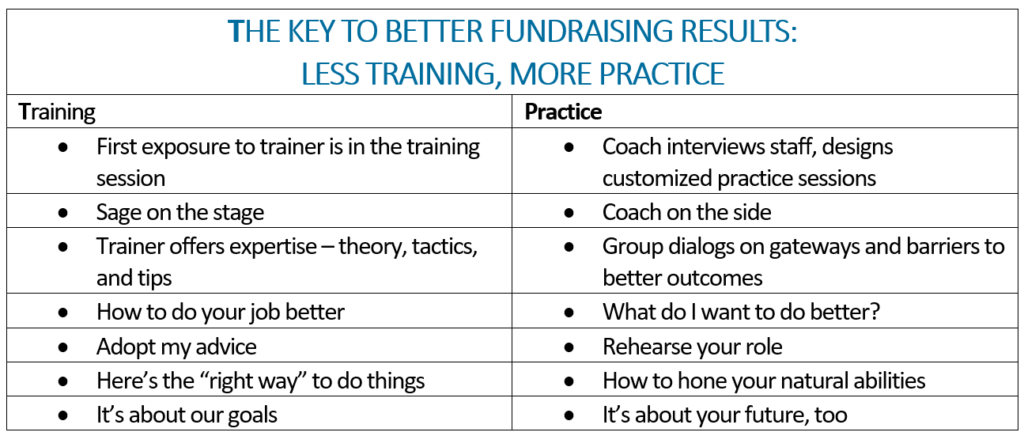What happens all too often when advancement leaders announce that they’re bringing in an expert to train their staff? Some staff members get their backs up. They feel the decision is like saying:
“You’re not good enough.”
“I think you could be doing a better job.”
“We need to learn from those who are doing a better job.”
They brood:
“That just shows that my boss doesn’t really know what a good job I’m doing.”
“Who says this supposed expert knows more than I do?”
“How can somebody tell us how to do our job better if they don’t actually know what we do?”
Many of those concerns can be well placed. Hearing that an outside expert is coming in to “train” you can seem to be condescending and diminishing. It can have a negative impact on even the highest achievers.
But wait a second, doesn’t every great musician, performer, athlete, and high-achiever in every field continue to train even when they’re at the top of their game? In fact, don’t they train for hours every day? Isn’t that what made them great and keeps them great? Yes, but they don’t view it as being trained on how to hit a ball, a high note, or a responsive chord with their audience. They view it as practicing to get better at what they already know how to do very well. They view it not as an expectation of their boss but as an investment in their stature and their future.
When advancement leaders bring in coaches to help people refine what they already do well, and allow them to help design the practice sessions, they send a much more affirmative signal.
The comparison below suggests how we can keep valuable people from feeling minimized by generic training sessions and make them feel more valued by being afforded an opportunity to enhance their abilities for their own sake and that of the organization.
Oh, but remember, if we’re going to practice at getting better fundraising results, it can’t just be limited to those in advancement. It must include the executive team, the board, and top volunteers, and all those that create the programs and services donors will be asked to invest in. Practice makes perfect if the whole team, cast, orchestra, or organization participates.

Jim Langley is the president of Langley Innovations. Langley Innovations provides a range of services to its clients to help them understand the cultural underpinnings of philanthropy and the psychology of donors and, with that knowledge, to develop the most effective strategies and tactics to build broader and more lasting communities of support. Jim has authored numerous books including his most recent book, The Future of Fundraising: Adapting to New Philanthropic Realities, published by Academic Impressions in 2020.
Related Resources:
- Webinar: 4-Step Process for “Reimagining Fundraising Operations”
- 7 reasons why wealth screening your donor list might be an incredibly foolish activity
- How Confident Is Your Fundraising Posture?
- At last, the one big thing every fundraiser needs to know to be successful
